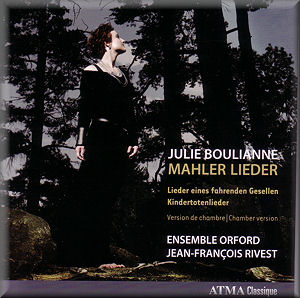 |
 |
|


alternatively
CD:
MDT
Sound Samples & Downloads
|
Gustav MAHLER (1860 – 1911)
Lieder eines fahrenden Gesellen (orch. Arnold Schönberg)
1. Wenn mein Schatz Hochzeit macht [4:05]
2. Ging heut’ Morgen übers Feld [4:21]
3. Ich hab’ ein glühend Messer [3:04]
4. Die zwei blauen Augen [5:36]
Kindertotenlieder (orch. Reinbert de Leeuw)
5. Nun will die Sonn’ so hell aufgeh’n [5:43]
6. Nun seh’ ich wohl, warum so dunkle Flammen [4:59]
7. Wenn dein Mütterlein [5:25]
8. Oft denk’ ich, sie sind nur ausgegangen [3:12]
9. In diesem Wetter, in diesem Braus [6:07]
Alma MAHLER (1879 – 1964)
Fünf Lieder *
10. Die stille Stadt [2:55]
11. In meines Vaters Garten [5:34]
12. Laue Sommernacht [2:09]
13. Bei dir ist es traut [2:11]
14. Ich wandle unter Blumen [1:09]
 Julie Boulianne (mezzo)
Julie Boulianne (mezzo)
Ensemble Orford/Jean-François Rivest, Marc Bourdeau (piano)*
rec. July 2011, Salle Claude-Champagne, Faculté de musique de l’université de Montréal (Quebec), Canada
Texts with French and English translations enclosed
 ATMA ACD2 2665 [56:43]
ATMA ACD2 2665 [56:43]
|
|
|
Lieder eines fahrenden Gesellen and Kindertotenlieder
are or have been available in almost uncountable recordings.
No, there is a French site on the web that has counted them.
Until last year there had been 134 recordings of Lieder
eines fahren Gesellen. And I own one that wasn’t on that
list. True, some of those 134 were arrangements for tuba and
piano, for trombone and piano, for piano solo and so on, but
remove those arrangements and there are still more than 120
complete cycles! Many are live recordings, many are with piano
accompaniment and many are in Mahler’s own orchestral version.
There are also quite a few in Arnold Schönberg’s orchestration,
the earliest I could find from 1985 with Anna Holroyd (Auvidis).
Since then there have been a dozen or so further issues, so
the Schönberg version isn’t really a rarity but for me it was
since for some reason I had never before come across any of
that dozen recordings.
For those wondering why Schönberg should contemplate re-arranging
Mahler’s music at all some historical information could be useful.
In 1918 Schönberg and some of his pupils founded Verein
für musikalische Privataufführungen (The Society for Private
Musical Performances) in Vienna. There people with a positive
attitude to new music were able to hear what were then contemporary
composers. The financial resources were slight and they couldn’t
afford an orchestra so Schönberg devised an ensemble consisting
of a string quintet, flute, clarinet, harmonium and piano. With
these forces it was possible to bring out melodic, harmonic
and structural features. When Schönberg wrote his arrangement
of the Mahler cycle he added a percussionist to keep the triangle
and glockenspiel from Mahler’s original. Kindertotenlieder
was arranged in 1991 by Reinbert de Leeuw, the founder and director
of Amsterdam’s Schönberg Ensemble. He followed the same principles
as the Society for Private Musical Performances.
It says a lot for both Schönberg’s and de Leeuw’s arrangements
that one seldom or never misses Mahler’s own orchestrations.
On the contrary they illuminate the songs and make one listen
with new ears. This is particularly evident in Kindertotenlieder
where the chamber size ensemble lends a vulnerability to the
music that rhymes very well with the words. In diesem Wetter
even sounds more modern in this version. The playing of Ensemble
Orford is first class in every respect and Jean-François Rivest’s
tempo choices are sensible.
Canadian mezzo-soprano Julie Boulianne has had a lot of rave
reviews lately, not least for her recording of Ravel’s Shéhérazade
a couple of years ago (Naxos). ‘Julie Boulianne’s singing is
gorgeously expressive’ wrote my colleague Dominy Clements and
concluded: ‘...a version ... to which I would happily listen;
long and often ...’ Listening to her Mahler I was at once struck
by the sheer beauty of her voice, her care over nuance and her
intensity in expression. It’s a vibrant voice but not excessively
so. The Lieder eines fahrenden Gesellen are splendid
readings; the Kindertotenlieder even more so. It’s
a deeply involved reading, dark and vulnerable. Wenn dein
Mütterlein is almost unbearably tragic, and the end of
In diesem Wetter remains in my memory long after the
song – and the cycle – is over. There are many superb recordings
of both these cycles and it is practically impossible to pick
a clear winner, but Julie Boulianne belongs among the best.
Alma Schindler, 19 years younger than Mahler, had studied with
Zemlinsky and was already a promising composer when she met
her husband-to-be. Before their wedding in 1902 Mahler however
demanded that she should give up composing. She obeyed but in
1910 Mahler changed his mind, obviously on advice from Sigmund
Freud. Mahler even helped her revise the Funf Lieder
and arranged for them to be published the same year. The songs
are splendid evidence of Alma’s talent as composer and it is
a shame she wasn’t allowed to compose more. These five plus
Vier Lieder (1915) and Fünf Lieder (1924)
was long her total output but in 1999 another two songs were
published posthumously. The songs are melodically attractive,
harmonically interesting and she had marvellous sense for the
marriage of words and music. Her choice of poems was discriminating:
Dehmel, Hartleben, Falke, Rilke and Heine provided the texts
for these five songs. The piano part is also transparent and
flexible. Maybe Mahler realised that she could be a worthy competitor,
even outdo him. Julie Boulianne sings the songs with obvious
affection and Marc Bourdeau, who also wrote the liner-notes,
makes the most of the accompaniments.
This is a valuable disc for several reasons: it sheds new light
on Gustav Mahler’s two song cycles - at least for those who
are unfamiliar with the chamber ensemble accompaniments - it
puts the spotlight on Alma Mahler’s talent. It also introduces
many listeners to the rapidly rising new mezzo-star Julie Boulianne.
Göran Forsling
|
|












